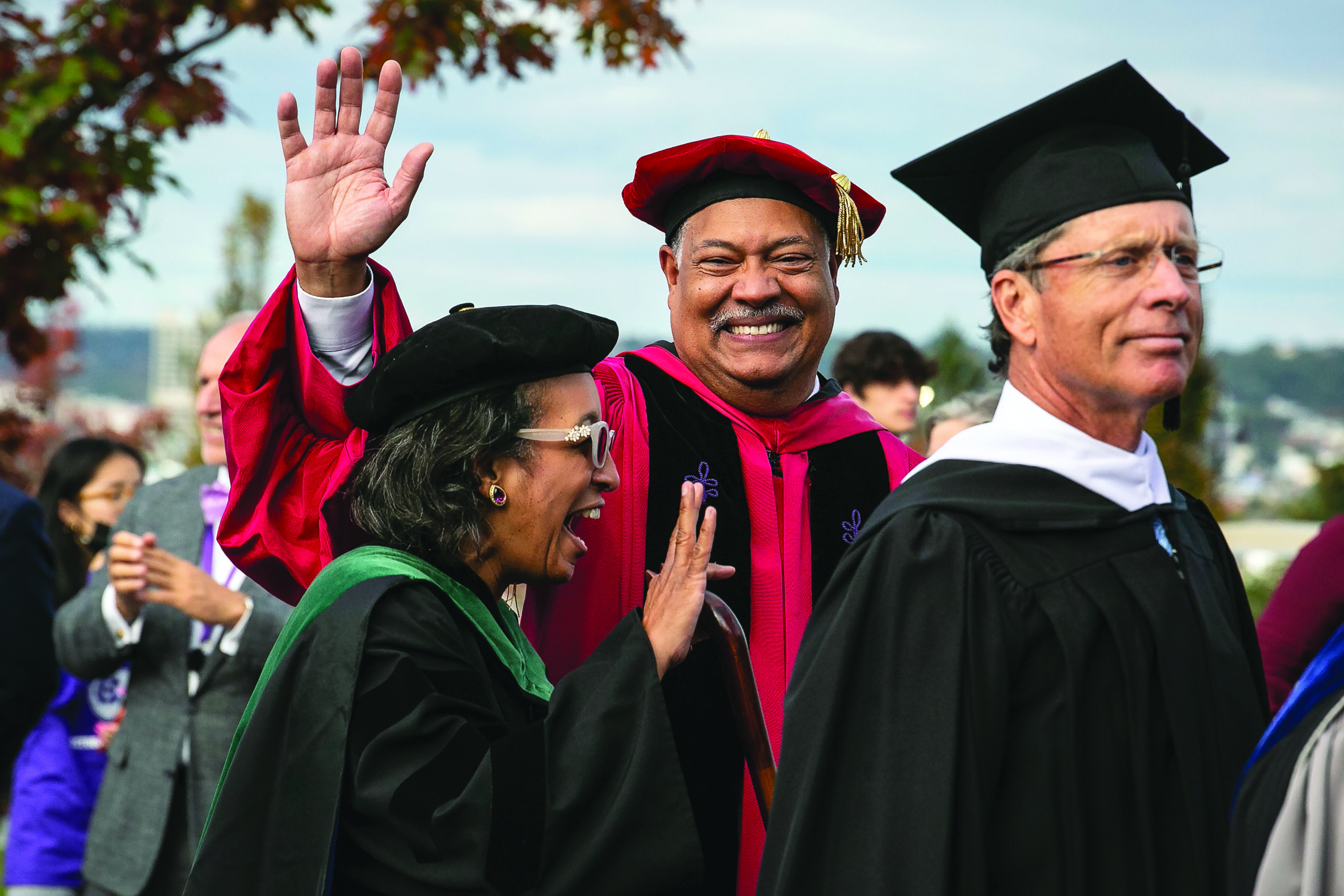The College of the Holy Cross is unabashedly a liberal arts institution, developing the next generation of leaders for more than 178 years. But it isn’t afraid of change. Last July, it made one of the most transformative hires in its history, installing Vincent Rougeau as its first Black and lay president.
Rougeau’s trajectory to the top was a natural for the college on the hill in Worcester, Mass. He had cultivated deep roots at Jesuit institutions, including Boston College, where he was Dean of its Law School. Holy Cross is one of several institutions in 2022 finding value in branching out from its traditions, namely putting promising individuals of color, women and laypeople in power positions.
“I think we’re seeing a real moment in higher education in a lot of different ways,” Rougeau says. “The model is under a lot of stress for various reasons. What you’re seeing, particularly at Jesuit institutions, is a recognition that passing the leadership baton to laypeople who come up through higher ed may be an important shift to make at this time when there are so many new challenges. The people who have spent a lot of time with the Jesuits in these institutions understand the mission and the identity.”
The mission of the highly selective Holy Cross is one of serving students well, and, as Rougeau says, “is built on respect for all people.” It is rich in accolades as one of the best Catholic schools in the nation and one of the best for the money, with a 96% first-year retention rate and a 93% graduation rate after six years. It continues to have alumni emerge on the national stage, including infectious disease specialist Dr. Anthony Fauci, whom the college will honor later this year by naming its Integrated Sciences Complex for him. But it is also intent on becoming more diverse, with strong financial aid packages and policies such as test-optional admissions for new students.
“There are real opportunities to expand access amongst students whose parents never attended college, to reach out to immigrant communities and traditionally underserved communities,” Rougeau says. “That’s really where the growth is. If we’re not looking at how we make our environment attractive to those students, we’re missing an opportunity. But once they come to campus, you can’t say, OK, that’s done. You really have to understand what their needs are going to be throughout their four years.”
To learn more about Rougeau’s ascent at Holy Cross, his institution’s latest endeavors and some of the biggest issues facing higher education, University Business sat down for a conversation with the president.
What is the value of a liberal arts education in 2022?
A lot of people take on this college decision and say, ‘Here’s what I want to do when I leave college, and this will get me there.’ A liberal arts education allows you to do that but it also develops a broader set of skills. You have a broader understanding of history and people and math and science. What we often see amongst our alumni is this amazing trajectory toward leadership. Anthony Fauci is a great example. He was a classics major. He’s one of many who have become leaders in their fields, not in small part due to the kind of education they had.
Speaking of Dr. Fauci, can you talk about what he’s meant to the college, and also how the college has responded to COVID during the pandemic?
Dr. Fauci will be back on campus in June for his 60th reunion. One of the reasons we wanted to honor him is how he represents the power of a liberal arts education. He chose to take his degree in medical training and employ it in the service of the country, being a doctor focused on diseases that were hitting communities that were somewhat marginalized—AIDS, Zika and Ebola. It’s a great model for what we try to focus on a Jesuit institution, being men and women for and with others, and looking beyond ourselves in how we use our training.
In terms of COVID, like all campuses, it’s been a struggle to stay on top of it. We are a residential college, and our students live in close proximity to one another. We have to be cautious about the spread of all diseases and illnesses. Our campus is pretty much back to normal. For our freshmen and sophomores, it’s been nice for them to return. It’s going to ebb and flow, but we can’t shut down every time we see a surge. So we’re figuring out how to live responsibly with the virus.
One of the overarching themes around COVID, and in higher education, is the notion of common good, which you addressed recently in a panel session. Why that’s so important right now?
Something I’ve looked at a lot in my academic work is how we have this tension in American culture between respect, an emphasis on individual accomplishment and the notion of community. We want people to fulfill their aspirations as individuals and to have freedom to make their own choices. But our personal needs may need to be modified in an effort to support weaker members of the community. We need to spend more time as a country talking about how we do things together, how that means sometimes we can’t get everything we want and what the benefits of that are.
The pandemic, social justice and critical race theory all have been topics that have become polarizing. What is a college’s mission in addressing these issues?
An important role is to be places where there are honest and open conversations about the past, about the things we’ve done well and the things we haven’t done well, what we might learn from it, and how we might move forward. There continue to be major racial disparities around lots of different issues—education, economics, and homeownership. There are different theories about why that is. We have to be willing to have those conversations. We can’t fix them if we don’t comment on them. The one thing we don’t want to do is say we’re not going to allow that to be discussed. We’re not going to move beyond our problems if we’re not willing to face them. That’s why it’s important that we educate our young people to have critical-thinking skills.
What are the traits that make for an effective president in 2022?
I’m still working on those! Being an effective leader requires being a very active listener. You have to understand what people’s hopes and fears are. You also have to be a firm decision maker. I think some leaders fall into the trap of trying to sort of kick things down the road. Sometimes nothing’s going to change, and the decision has to be made. Some people aren’t going to like it. I do think people respect a person who has been open and honest about why certain things have to change. If you’re inclusive, people will feel that they are able to participate in a process that produces decisions for the group. You have to be creative and innovative. The way we did things in the past is not going to give us answers for how we’re going to do things in the future. You have to be willing to make some mistakes and learn from areas outside of higher ed. And then have luck.
More from UB: The President Series
- University of Oklahoma: A flagship university that is changing lives on campus
- Western New England: What is a new traditional university and why is the vision so vital?
- Midland: Small university continues to be ‘relentlessly relevant
- Purdue: Growth tied to keeping students at center of bulls-eye
- Muhlenberg: Leading the way as pioneers for women
- Stetson: Why kindness has been one of the keys to Stetson’s success
- Waubonsee CC: Remaining relevant requires deep focus on students, employees
- Dominican: Providing support for first-gen students
- Rockland CC: Is this a time of opportunity for community colleges?
- University of Montana: How higher ed can work for veterans
- Quinnipiac: Creating partnerships and lifelong learning








